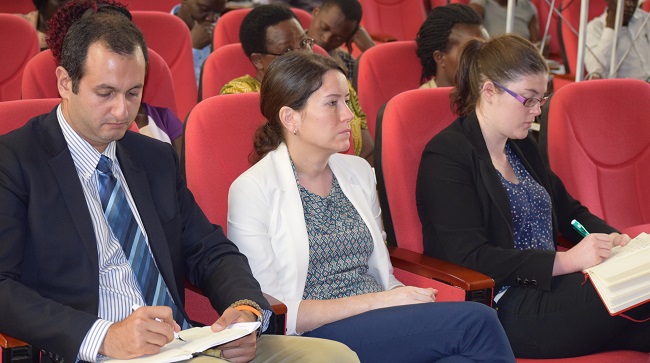On 14th September 2015, Makerere University Peace and Conflict Studies Centre in conjunction with Istanbul Policy Centre (IPC), Sabanci University held a lively discussion inspired by Turkey’s positive attitude towards Africa’s development. Convening in the Makerere University Main Hall, Scholars from Istanbul Policy Centre led by The IPC Resolution and Mediation Stream Scholar Prof. Bulent Aras shared knowledge on how Turkey’s principle of “Equal partnership and mutual benefit” can be harnessed as the paramount approach to collaborations between Africa and other countries.
Driven by the captivating theme of the day: “Turkey’s Engagement in Africa’s Development”, Scholars drew the audience’s attention to the Turkey-Africa common values and interests which include; democratic governance, boasting young and promising population, economic potential and independence.
During the discussions Scholars pointed out that, African countries should focus on mutual support and independent development rather than dependency when collaborating with European countries. They also agreed that Africa should always look out for relationships which will develop her economically, socially and culturally.
According to Prof. Onur Sazak-IPC’s Research and Academic Affairs Manager, Turkey’s development perspectives for Africa are central to research and academic affairs. In his discussion on “The shifting Axes of International Aid: Are Traditional Donors from Mars, Emerging Powers from Venus?” Prof. Sazak said that, it is through the equal partnership and mutual benefit principle that Turkey has been able to assist Africa in academics by focusing on capacity building, social infrastructure development, training and constructing vocational schools.
He explained that Turkey’s role in the International Development Cooperation has gone through fundamental changes. To him, new economic dynamics and an increasing sense of responsibility for global peace and sustainable development has enabled Turkey to emerge as a new and dynamic player in the international development cooperation architecture.
“My observation tells me that the traditional donors follow a more aggressive approach. These different approaches are apparent and states have not been very happy about the number of countries coming in for global peace” he said.
He examined the different approaches to donations which among others, mentioned securitization of aid as one of the major global concern. Prof. Onur said that many African countries have fallen victims of the repercussions of the Aid given to them with strings attached.
Focusing on Medical Humanitarianism of Turkey’s NGOs: the Case of Uganda; The IPC Resolution and Mediation Stream Scholar Prof. Bulent Aras, mentioned that the rapid growth and constructive involvement of Turkey’s Non Governmental Organisations (NGOs) in Africa’s community affairs is heavily felt on the global arena. He believes that, the community outreach approach adopted by Turkish Humanitarian NGOs have led to fundamental changes in Africa’s health, infrastructural, academic and economic sectors.
“In the research we carried out using Uganda as case study, we discovered that the growth and involvement of NGOs in African affairs is due to their ability to reach out to the community. African countries have failed to reach their society in terms of needs and information creating a knowledge-information gap between the governments and its people. This has given the NGOs a go ahead and provided a supplementary role in public health, education and capacity building,” he said.
Prof. Bulent further noted that unlike the traditional humanitarian approach that deals with middlemen, Turkey’s Humanitarian Organisations deal directly with people in need.
Speaking about the limelight of Humanitarian NGOs in Turkey’s Peace Building and Africa’s experiences, the IPC Conflict Resolution, Mediation Stream Scholar Ms. Pınar Akpınar said that Turkey has established networks through its humanitarian assistance together with its emphasis on business development, that allow the Turkish Ministry of Foreign Affairs (MFA) to follow up with peace building initiatives.
“The engagement of the Turkish NGOs in efforts to mediate among various conflict actors primarily emphasises their respect for local partners in finding home-grown solutions to their problems. These NGOs have been able to develop two models of peace building and these include militarization of aid and Humanitarianism” she explained.
According to IPC Researcher Ms. Auween Woods, so many activities have been developed to promote peace and security in the war torn countries. In her presentation on “Turkey’s Approach to Peace Building and Africa’s Experience”, Ms .Woods shared that Turkish NGOs have been able to support the military crews during wars, promote capacity building, as well as engage in health, education and construction projects so as to build and maintain peace on the African continent.
“Through Military NGOs, Turkey has extended a service to war affected countries. The country has invested in orphanages like the Child Fund Orphanage in Uganda, awarded scholarships to students to study in Turkey and provided technical skills to African children,” she added.
Ms. Woods stressed that although the Turkish organisations have ensured sustainability, they still face challenges which have negatively impacted their existence. “Most Turkish NGOs face challenges in monitoring the aid since many of them have just been established. In addition to that, the organisations lack security since most of them are heavily dependent on volunteers when they are in filed,” she said.
Article by: Nabatte Proscovia


 General2 weeks ago
General2 weeks ago
 Natural Sciences2 weeks ago
Natural Sciences2 weeks ago
 Agriculture & Environment1 week ago
Agriculture & Environment1 week ago
 Health2 weeks ago
Health2 weeks ago
 Health2 weeks ago
Health2 weeks ago


